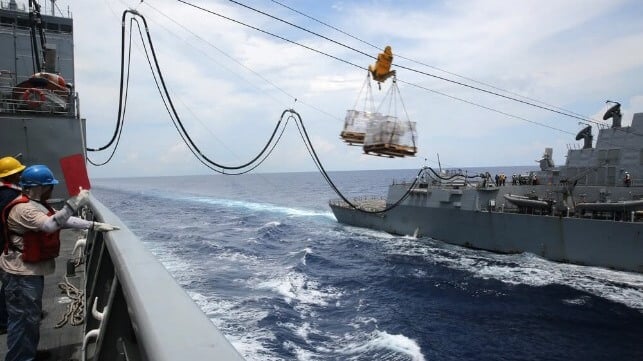U.S. Navy Confirms Plan to Idle 17 Auxiliary Ships to Improve MSC Workforce

U.S. Navy commanders confirmed yesterday, November 21, that they will be taking steps to realign the operations of the Military Sealift Command under the guise of improving working conditions for the mariners and strengthening logistic support operations. Reports had surfaced during the summer that a plan was in the works driven in large part by a shortage of qualified mariners to operate the ships.
“Addressing the recruiting and retention challenges in MSC’s civil service mariner workforce will take time,” said Rear Adm. Philip Sobeck, MSC’s commander during a briefing on the new plan. He reported that Secretary of the Navy Carlos Del Toro approved the plan on October 30 saying it was designed, “to restore the health of the Military Sealift Command (MSC) workforce and generate more logistics support for fleet operations worldwide.”
The command’s new workforce initiative they said addresses civil service mariner recruitment and retention challenges. They highlighted that MSC consists of 5,500 civil service mariners and 1,500 contracted mariners operating 140 logistics supply ships that support the replenishment and transport of military cargo and supplies for U.S. forces and partners.
They are also saying that MSC has assumed broader logistics responsibilities and experienced higher mission demand for Navy operations in recent years. They blamed all these factors for increasing the strain on the workforce and contributing to recruiting and retention challenges.
The initiative will include crew reassignments to higher-priority vessels according to Sobeck. During the briefing, he said the goal is to reach 95 percent manning.
To achieve this, Sobeck confirmed that the plan includes “the placement of some MSC logistics support ships into extended maintenance periods.” He declined to name the specific ship that would be idled saying it depends on operational priorities and planned maintenance cycles. MSC command, however, said it expects up to 17 ships to be idled in the realignment.
The announcement said that the types of ships for the workforce initiative include Fleet Replenishment Oilers (T-AO), Dry Cargo/Ammunition Ships (T-AKE), Expeditionary Fast Transports (T-EPF), and Expeditionary Sea Bases (ESB). USNI News speculated in August that one fleet oiler, a dozen EPFs, two forward-deployed Navy expeditionary sea bases, and two Lewis and Clark-class replenishment ships could get inactivated.
By increasing the workforce and decreasing the number of ships, MSC expects to increase its operational capabilities while also providing more shore time for the mariners. Nationally, they said the U.S. merchant marine workforce is facing a shortage of personnel to fill positions at sea, as it has become more challenging to attract interested Americans, impacting mariners employed by MSC. Rotating crews to higher-priority vessels will minimize overdue reliefs and provide a more predictable work environment for civil service mariners.
“Our civil service mariners play invaluable roles providing continuous logistics support to our deployed naval forces, and they are working overtime to sustain that mission globally,” said Secretary Del Toro. “This initiative will not only address operational logistics challenges we face now, it will ensure that Military Sealift Command has policies, programs, and incentives it needs to recruit and retain future generations of civil service mariners.”
The Navy is emphasizing that these investments will increase MSC’s operational readiness and support its civil service workforce, both of which strengthen maritime dominance.

that matters most
Get the latest maritime news delivered to your inbox daily.
The moves by the U.S. follow similar efforts by the UK. The Royal Fleet Auxiliary is also reporting staffing shortages although the unions blame it on an ongoing wage dispute and chronic low wages for the commercial mariners. The RFA has sidelined vessels and is also taking steps at realigning operations to deal with chronic workforce shortages.
